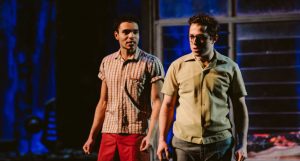
Alexander Ewers
Set in the small country backwater of Corrigan, the rich fabric of this eponymous fiction, Jasper Jones, is fashioned anew by the SA State Theatre Company. Following in the footsteps of much acclaimed text and screen forebears, this stage iteration does not disappoint.
Jasper Jones is a murder story. It is a coming of age story. It is a story of injustices familiar to the Australian psyche and yet which feel freshly painted in this telling. It is a story of a country town: the people are uninspiring, the town is unlovely. And yet it is all acutely identifiable, uncomfortably familiar in its Australianness [sic]. Set among stringy-barks and hot idle summers, Jasper Jones is a tale woven to the tune of the distant drone of an attritive Vietnam stalemate, and the droning attrition of a distant Ashes test match. Against this backdrop, a dispiriting paralysis of community apathy weighs heavily: jaded routines, the meaningless repetitions of daily tedium, and generational cycles of the unimaginative and the intransigent. In some ways the plot feels predictable, or rather inevitable, a story destined to unfold according to a pre-determined template against which none can prevail. The atmosphere of dulling torpor harnessed in this production is a worthy achievement. Herein Nescha Jelk (Director) and co have excelled, capturing that latent national spirit, a force neither in and of itself good or evil, and yet determinative for both – that uniquely Australian lethargy.
For a two hour show, Jasper Jones spotlights an impressive array of the faces of jaundice and prejudice to which the narrow-minded resort. The tropes are familiar territory – racism (both overt and subliminal), female disenfranchisement, xenophobia, domestic violence. And yet an attempt to define or categorize Jasper Jones by any one of these topics is to diminish the weight of the grander narrative. Rather, like the towering stringy-barks that dot the stage space and dwarf the elegant simplicity of the locative scene props, these loudly declarative, and in some ways fashionable motifs threaten to obscure the forest for the trees. It is useful for perspective, to consider that to all intents and purposes, Corrigan is still Corrigan at curtain fall. Jasper Jones remains the target of racism; the molestive father remains unchallenged; the town remains parochial; and the immigrants remain marginalized. Yet Corrigan has birthed a groundswell of unlikely, often subtle, and always intensely individual revolt against the societal inertia that lies beneath each of the injustices rife in the Corrigan (and Australian?) community. This insurgence takes form in the open revolt of Jasper and his allies, the escapism of Charlie’s mother and the bitter disengagement of Mad Jack, the despair of Laura’s suicide, the impervious optimism of a Jeffrey, and in the stoicism of Jeffrey’s father. The trees may have barely moved, and yet the forest and its denizens are much-changed.
This is no easy idea to convey. Indeed, the performance as a medium grapples with the complexity inherent to the original written plot. The necessarily reductive nature of a stage adaptation struggles at times to balance individual character trajectories against the wider plot superstructure, lacking the author’s or cinematographer’s privilege of temporal and descriptive luxury to support multiple narratives. Consequently, peripheral characters suffer oxygen-deprivation, and absent the sufficient support infrastructure, transitions between the grim and the whimsical feel sometimes dissonant. Similarly, the resorting to explanatory narrations of internal dialogues is at times faintly disruptive rather than facilitating. It is no doubt an unenviable task conveying the inertia that defines Corrigan whilst convincingly advancing the action, a balancing act only complicated by the imperative for faithfulness to the original text. The stage medium is perhaps simply unable to completely satisfy on that front. To the tribute of those on stage though, such captious technicalities do not dim a whole-hearted and convincing performance by all the cast. The thespian commitment runs deep, with even the supporting characters invested with impressive authenticity. As the play progresses, any moments of disconnect are ironed out, so much so that post-interlude, the coherence of the performance commands the total absorption of its audience.
Jasper Jones is compelling, in person and in play. It strikes close to home, perhaps closer than is comfortable. It is relatable across multiple layers of the individual, communal and national experience. In closing, one notes that much mention is made throughout the performance of the idea of “The Great Australian Story”. It is not difficult to muse that perhaps in this adaption of Jasper Jones, one can find a convincing retelling of a story that is candidate for just such a title.
Kryztoff Rating 4.5K


Recent Comments